
Exposé Online
What's old
Exposé print issues (1993-2011)
- 1 (October 1993)
- 2 (February 1994)
- 3 (May 1994)
- 4 (August 1994)
- 5 (October 1994)
- 6 (March 1995)
- 7 (July 1995)
- 8 (November 1995)
- 9 (March 1996)
- 10 (August 1996)
- 11 (February 1997)
- 12 (May 1997)
- 13 (October 1997)
- 14 (February 1998)
- 15 (July 1998)
- 16 (January 1999)
- 17 (April 1999)
- 18 (November 1999)
- 19 (May 2000)
- 20 (October 2000)
- 21 (March 2001)
- 22 (July 2001)
- 23 (December 2001)
- 24 (April 2002)
- 25 (September 2002)
- 26 (February 2003)
- 27 (August 2003)
- 28 (December 2003)
- 29 (April 2004)
- 30 (September 2004)
- 31 (March 2005)
- 32 (September 2005)
- 33 (May 2006)
- 34 (March 2007)
- 35 (January 2008)
- 36 (October 2008)
- 37 (July 2009)
- 38 (July 2010)
- 39 (Summer 2011)
Features
Listening to the Little Demon —
The Alex's Hand Interview

In this or any other musical era, the band Alex's Hand stands out as different. Very little about them, from the music they play to the convoluted story that has taken them from Seattle to Berlin, conforms to expectations or standards. "Fiercely independent" is an understatement of their attitude. I've been a fan since I first saw them in a dive bar in Seattle, and have kept up with them ever since. I caught up with them from Berlin via email.
by Jon Davis, Published 2017-08-04
I caught up with the band's core members, Kellen Mills and Nic Barnes via email, and they were kind enough to share their thoughts for all to read.
- K: Kellen Mills — Bass
- N: Nic Barnes — Drums
What are your earliest musical memories? How did your conception of music develop?
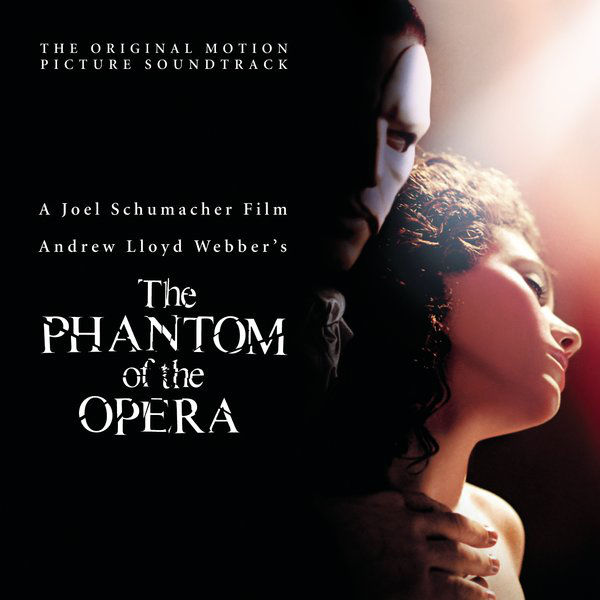 K: The first thing I actually remember hearing is the Phantom of the Opera soundtrack that my mom bought. It was in rotation at our house constantly and I loved it. Growing up I remember listening to a lot of crappy 80s pop, musicals (mom’s favorite), 70s and 80s pop rock (dad’s favorite). Stuff of that variety. When I entered high school I heard Pink Floyd for the first time (which sounds like a cliché) but it obliterated whatever I thought about music being. It went from being something I enjoyed to an entire artform. I connected that music is art, a painting if you will, and many of the ideas and existentialism of Pink Floyd changed my entire viewpoint towards what music can be. They also pointed me in the direction of my main musical hero inadvertently. Mr. Zappa, who finalized that surprise, concepts, orchestration and breaking boundaries is what music is all about. Or it isn’t. Hah. Is it about anything at all?
K: The first thing I actually remember hearing is the Phantom of the Opera soundtrack that my mom bought. It was in rotation at our house constantly and I loved it. Growing up I remember listening to a lot of crappy 80s pop, musicals (mom’s favorite), 70s and 80s pop rock (dad’s favorite). Stuff of that variety. When I entered high school I heard Pink Floyd for the first time (which sounds like a cliché) but it obliterated whatever I thought about music being. It went from being something I enjoyed to an entire artform. I connected that music is art, a painting if you will, and many of the ideas and existentialism of Pink Floyd changed my entire viewpoint towards what music can be. They also pointed me in the direction of my main musical hero inadvertently. Mr. Zappa, who finalized that surprise, concepts, orchestration and breaking boundaries is what music is all about. Or it isn’t. Hah. Is it about anything at all?
N: I guess I had a fairly musical childhood. My dad is a composer and accompanist for a ballet school in Seattle, so when I was young I would hang out there under the piano. My parents divorced when I was about two, and my mom started dating a drummer so we had a kit at the house. There was a lot of country music and Steely Dan floating around when I was a kid and there are weird videos of me dressing up like Elvis and performing at parties. My favourite song was “La Bamba” for about 10 years until I started listening to hiphop and rap in the 90s. My first rock albums were One Hot Minute by the Chili Peppers and The Presidents of the United States of America. There was always classical music around as well because both of my parents were involved with the ballet school. The whole grunge scene kind of passed me by and I listened to gangster rap primarily until high school, when I started listening to jazz, which kind of opened my world up. I had a brief but intense classic rock phase before discovering The Mars Volta and Tool, but then once I found out about Frank Zappa, that was kind of the beginning of the end. In college I discovered all the 20th century avant-garde stuff and was exposed to the R.I.O. movement, which I suppose is kind of at the heart of what I write now.
What kind of formal schooling do you have in music?
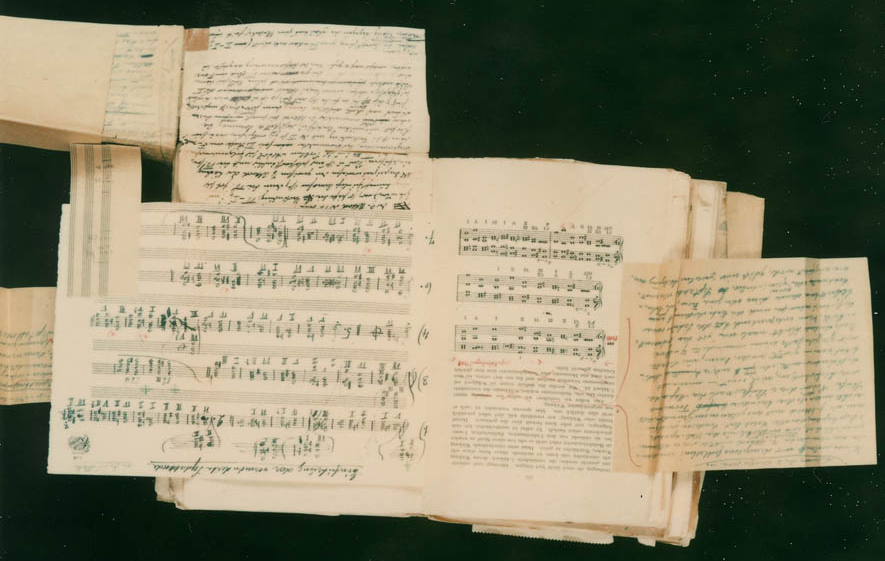 K: I took a little guitar in high school, studied piano in college and some theory and horn arrangement. Primarily I’m self-taught from playing bass by ear in punk type groups. I eventually drifted to teaching myself composition and reading books of the masters. Persichetti’s Twentieth Century Harmony and Schönberg’s Theory of Harmony are current favorites that I keep relying on. Most of my bass playing came originally from replicating Pink Floyd and Joy Division bass riffs. One for the blues, and the other because Peter Hook’s tone and melodic ideas were interesting as hell to me when I was younger. I of course switched gears once I started listening to Zappa, Mr. Bungle, and more fusionesque type fair. Patrick O'Hearn was an early favorite, as well as James Jamerson— If you can’t tell I like melodic bass players.
K: I took a little guitar in high school, studied piano in college and some theory and horn arrangement. Primarily I’m self-taught from playing bass by ear in punk type groups. I eventually drifted to teaching myself composition and reading books of the masters. Persichetti’s Twentieth Century Harmony and Schönberg’s Theory of Harmony are current favorites that I keep relying on. Most of my bass playing came originally from replicating Pink Floyd and Joy Division bass riffs. One for the blues, and the other because Peter Hook’s tone and melodic ideas were interesting as hell to me when I was younger. I of course switched gears once I started listening to Zappa, Mr. Bungle, and more fusionesque type fair. Patrick O'Hearn was an early favorite, as well as James Jamerson— If you can’t tell I like melodic bass players.
N: I began officially playing drums when I was about 10. I went through all the school bands — marching band, orchestra, and jazz band — until I was 19 and I started forming my own projects. Being in high school jazz band was my introduction to the drum kit and a huge influence on my style. I played in a few volunteer orchestras after high school to keep up my percussion chops and started playing more rock-oriented stuff. In college I started taking theory and composition classes eventually getting me BA in Composition and Audio Engineering from the Evergreen State College. I utilized the school studio quite a bit during this time to record and produce my own compositions and arrangements. Probably too much, because it resulted in me being barred from the studios for a brief period of time. I was doing mainly avant-garde orchestral type rock stuff with musicians from the community. To be honest it really prepared me well for what we’re doing now, which is basically the same thing.
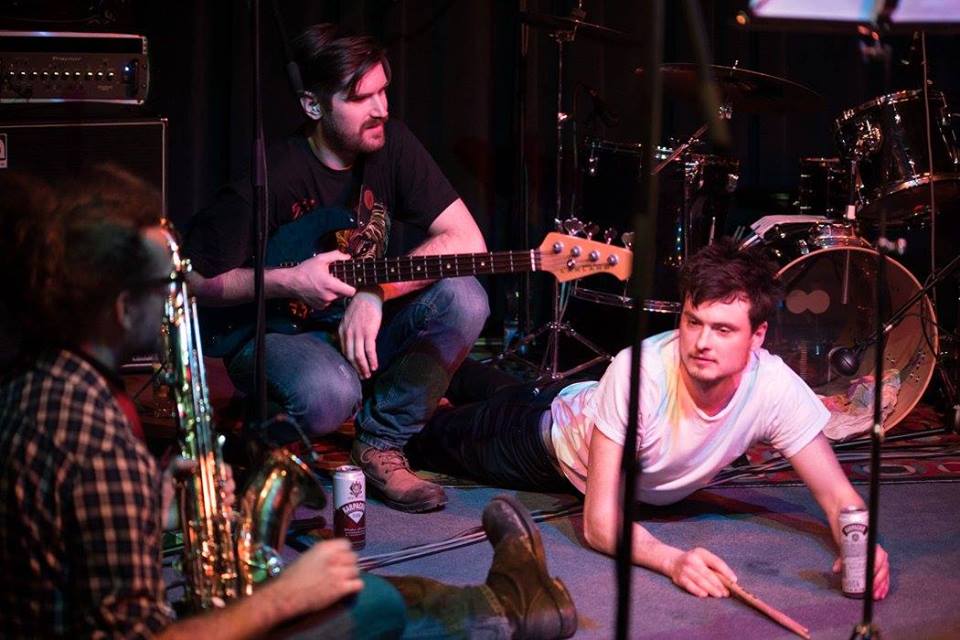 Tell me about your musical activities before Alex’s Hand.
Tell me about your musical activities before Alex’s Hand.
K: Honestly not much. I drifted around doing random projects with friends or musicians I knew. Punk , rock, folk, or things like that. I became bored pretty early with most band’s musical direction as they seemed so stuck to me. So I started just writing music by myself. I ended up collating a ton of songs just based off bass riffs, synth, and acoustic guitar that never really formulated into larger ideas. Until of course Alex’s Hand came to be.
N: When I was in high school I was in a few combos with people from the jazz band and we would play around at cafes in Seattle. In college I joined every band that needed a drummer, played on a lot of people’s recordings, and did a lot of open mics. I was composing my own material and doing collaborations with other people. My main project was a band called Malicious Discharge, which I formed with guitarist Mark Yates White, who would later become the first guitarist for Alex’s Hand. Originally it was just me and him jamming but eventually evolved into a five-piece with trombone and saxophone, Our music was this kind of zany blues math rock stuff, very Zappaish. We played a lot around Seattle, Tacoma, and Olympia and got some pretty solid recordings which are still up on Myspace.
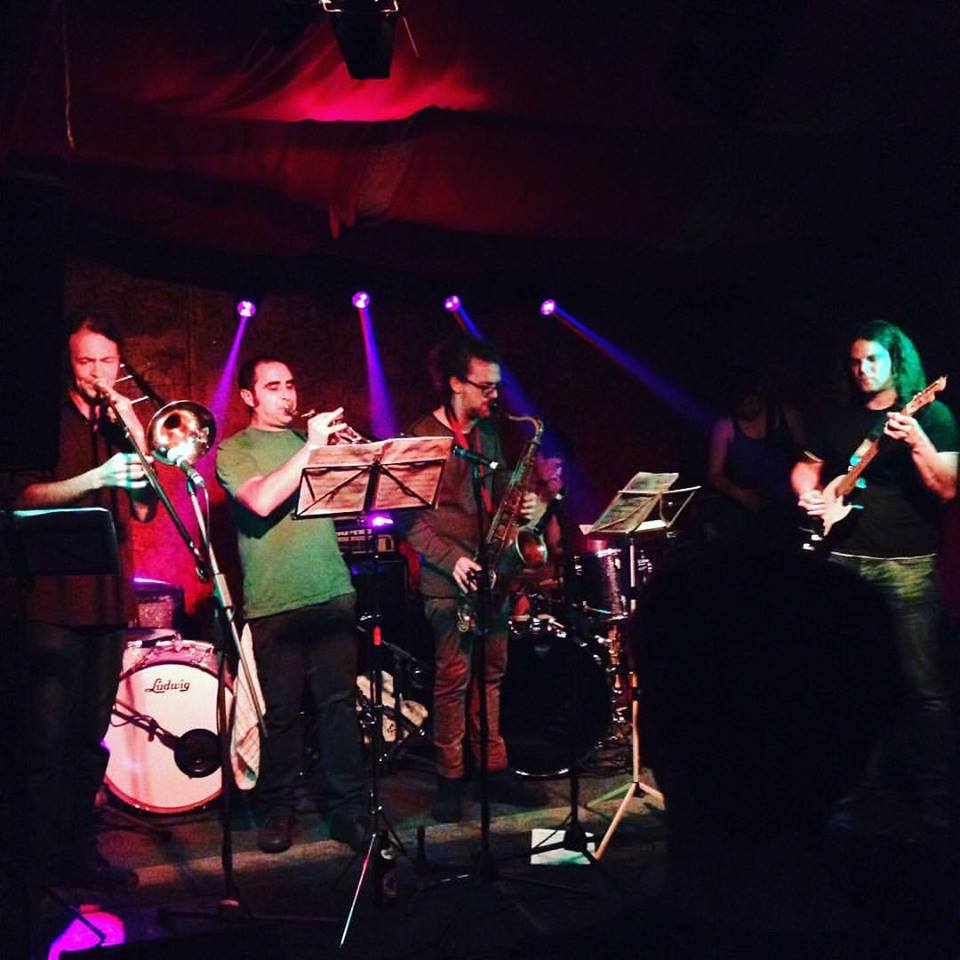 How did Alex’s Hand come together?
How did Alex’s Hand come together?
K: I recruited this guy (Kevin) I used to intern with at Robert Lang Studios in Seattle. I had all these songs and I was constantly searching for people who would be interested in playing or doing whatever with the material. He sorta played drums, bass, and guitar. So we formed a duo just bass drums, vox, and then overdubbing everything else. Synth, guitars etc. Anyway, he also played bass with Nic in Malicious Discharge. And he invited me to one of their shows. I saw Nic and Mark playing together at the Nectar Lounge and was completely blown away. I think I talked to one of them for a couple of minutes maybe. Nic and Mark were both living at the Kev’s house on Aurora near a crappy casino. And we sort of met that way. Kevin and Nic were jamming together at his house so I figured: “Hey, Nic plays drums, maybe he’ll be interested.” So I asked him to just record drums on some songs I wrote. Somehow that ended up with us playing above this crappy auto repair company called Superior Auto three or four times a week. The songs I wrote sorta fell by the wayside, though some of that material became Albatross and This Cat Is a Genius, and we just wrote a bunch of new music together. Eventually after three months or so we decided we needed a guitarist and Mark was a prime choice for that. We called ourselves “Alex’s Hand” for mysterious reasons and the three of us took over a planet.
N: We started off as really anti. We wanted to play complicated music with a punk ethos. Even the band name was sort of a rebellion in it’s own way. Kellen, Mark, and I together is sort of a recipe for disaster. We were pretty young and thought it was pretty funny to be really fucking loud and annoying and also play dinosaur math rock music. We still do I suppose, but I think we are more focused on the music these days. We were pretty unsatisfied with the musical environment of Seattle and were trying to kind of go against the scene and build a new community of musicians who felt the same way. The three of us had a great chemistry and our plan was to record the original material as well as possible so we could move onto the stuff that Kellen and I were writing together, which would become The Roaches and a yet to be released rock opera. Mark moved to Illinois, and so we sought out other people to record on The Roaches which is why you will find a plethora of guest guitarists on that album.
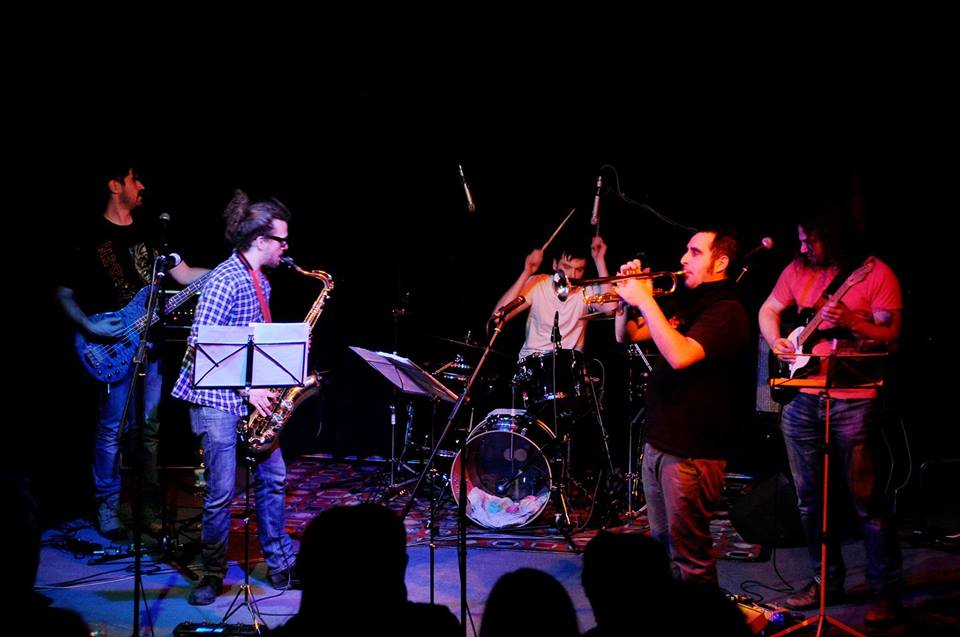 What do you see as the core of what Alex’s Hand is? In other words, what makes Alex’s Hand Alex’s Hand?
What do you see as the core of what Alex’s Hand is? In other words, what makes Alex’s Hand Alex’s Hand?
K: I’d say that Alex’s Hand is Nic and I. In whatever capacity and however the music ends up. We have a philosophy that is pretty powerful to us. It’s sort of abstract but it drives us to create what we do. Originally we formed as an almost antagonist to the music scene. We were reacting against a lot of the music and crap going on. And we wanted to show the audience that music is multifaceted, real and artistic in every sense of the word. Our dynamic is that we pursue all of our ideas and create concepts and stories that coalesce with those ideas. Now I feel that we always were / are a force of undistilled ideas. We ignored the marketing and the image and everything because we didn’t understand it, and just focused on the music or concepts surrounding the music. In the end it could just be how our personalities and everything came together.
N: Alex’s Hand is the complete exploration of Kellen and I’s untethered musical desires. We have never operated within the scope of genre (in fact have furiously resisted it) so our music can go in any direction. It’s in this way that we are experimental, I suppose. We try to entertain any idea that we have, and build from it, letting it set its own standards and form for what it will become. This is the recipe for what we do and we are in constant analysis of the music, recording, performance and each other’s approach. Like chiseling away at concepts until they can function perfectly with our collaborative world. We tend to resist convention but are also very studious and draw inspiration from as many sources as we can. However, in the end we are not truly experimental. In the end it just comes down to whether or not we think it sounds cool.
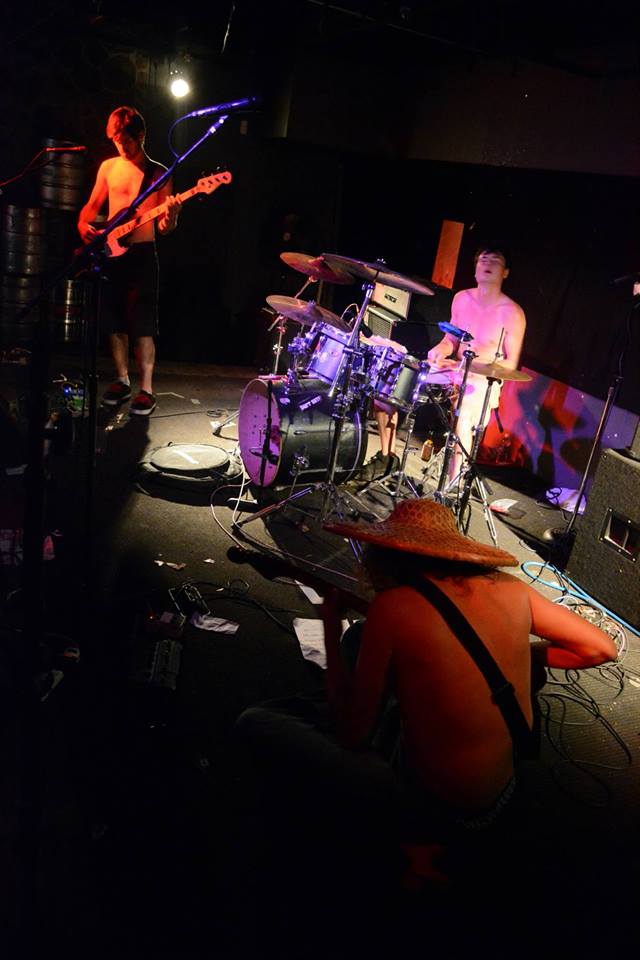 Looking back on your time in Seattle, how would you sum it up?
Looking back on your time in Seattle, how would you sum it up?
K: I’ve had a mixed view of my time in Seattle. I’d say I was disheartened by the almost close-minded view towards music and art that happened to us there. You would think a city like that would be open to ideas and insane music but in reality it just seemed like a ho-hum place for singer-songwriters, rappers, boring jazz, and DJs. Of course, many amazing artists and musicians live there that we know. But they hardly get the recognition they deserve. In reality KEXP just play’s “hip” music and it’s so enveloping that anyone who breaks out of that mold doesn't stand a chance. I’m still proud of the kick-ass musicians who are giving their all and believe in it despite the hardships though.
N: When I first moved back to Seattle with Mark, I had much higher hopes for Seattle and I was also a bit naïve about the music industry. Before I left there were a lot of cool loft parties, and bands like Critters Buggin were pretty big. It was a nice kind of post-jazz scene, which I really liked. I liked the idea of setting up shows with tons of percussion, synths, drums, guitars, and whatever in some loft or warehouse and just jamming out all night, making weird music. Malicious Discharge was pretty jazzy and I guess we wanted to enter that scene. However, when we got there the gentrification had really amped up and the hipster infestation was in full effect. The music scene had tapered a bit and people were being less experimental. There was still a lot of jazz but it has this sort of collegiate pompousness to it. KEXP and The Stranger controlled the output of music and despite all their efforts to bring new musicians into the spotlight, what they had really done was created a cozy musical club with a very specific style. I applaud their mindset but in reality this hipster authority only produces music that all sounds the same and anything being unique and against the grain or unsafe is sort of shoved under the rug and not taken seriously. On top of that, there were countless bands and venues who didn’t really understand that it wasn’t the 90s anymore. You can’t start a band and expect people to come out to your gig automatically and you can’t have a venue and expect people to come see shows at 10 bucks for bands they don’t know on a Tuesday night. And what you have is a bunch of failing venues and bands that give up and move to Europe to play in front of audiences that care and at venues that actually want you there. So when we started Alex’s Hand, we were really pushing to recreate this nebulous, flowing scene of experimental rock music. Where we probably failed was that we weren't very nice about it. We wanted music to be angry, bloody, desperately passionate, impossibly unique, and challenging for the listener. Instead what we kept seeing over and over again was very nice, easy music that everyone could enjoy without having any opinion about it or feeling challenged in any way. However, that's not to say that we didn’t connect with a lot of good bands at that time or play with outstanding musicians and I still applaud the efforts the people that are working hard to keep the scene afloat.
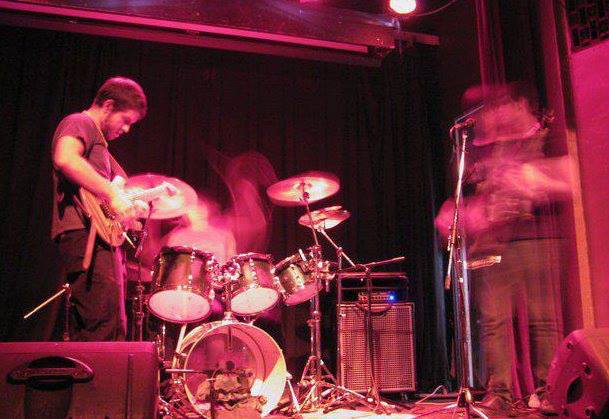 Tell me about the journey away from Seattle, and how you ended up in Berlin.
Tell me about the journey away from Seattle, and how you ended up in Berlin.
K: We went on a tour from Seattle, all along the West Coast to California. Played with some awesome bands, and then from Los Angeles we flew to Costa Rica. We were there for not too long and our guitarist Ben fell down into a ravine or something. He injured himself pretty bad. We were hoping before that to head into South America from Costa Rica and play music there. But we realized that it was such a nightmare because once you get down into South America it's really hard to travel around as a band. And we thought it’d actually be easier in Europe. After the Ben injury we went to New York and stayed for a couple days and then flew to Ireland while Ben went home to his parents to recuperate from his injury. From Ireland we went to England and went around looking for good music, couldn't find so much. And then we went to Berlin on a tip from some guy we met in Dublin. As soon as I got off the plane, I immediately loved it. I think the vibe was cool, street art everywhere, pretty parks, architecture etc. etc. Initially we just thought we’d have it be a home base for touring. But as Nic and I sorta became more and more involved in Berlin we just set up roots.
N: I was kind of ready to live anywhere.
How is the Berlin-based version of the band different or the same as the previous version?
K: We’ve had so many lineup changes in Alex’s Hand that it’s easier to explain it by era:
2012-2013 HUM DUMB CUM TRIO era
 Madame Psychosis, Albatross, This Cat Is a Genius: We were playing and wrote this material with Mark Yates White, but ended up recruiting other musicians to finalize the recordings when he left. This was our first foray into the Seattle scene playing with Ben Reece, Gabe Tachell, Steve Barnes, Shadough Williams, Bill Monto and Dan Pearson.
Madame Psychosis, Albatross, This Cat Is a Genius: We were playing and wrote this material with Mark Yates White, but ended up recruiting other musicians to finalize the recordings when he left. This was our first foray into the Seattle scene playing with Ben Reece, Gabe Tachell, Steve Barnes, Shadough Williams, Bill Monto and Dan Pearson.
As a live group we were only performing as a trio. But ended up adding and writing tons of additional material during the recording phase as far as arrangement goes. We recruited primarily guitarists and some keys/horn players.
2013-2014 We became roaches era
The Roaches, Cancumbia: This material came from Nic and I writing just with bass and drums and then slowly recruiting other musicians to make up the slack for Mark leaving us. We found Gabe Tachell (of Rhine) that Nic used to go to school with at Evergreen and then formed another trio with prewritten material. We recruited Jason Graber, Max Steiner, Jason Shao, Richard Williams, Bill Monto. And formed a live group with horns, keys, two/three guitars and group vocals. When recording The Roaches we had Dennis Rea, Alicia DeJoie, Jim DeJoie, and Ben Reece fill out the pieces. This was probably our largest ensemble up to this point.
2015-2017 Psychedelic pigeon crushing era
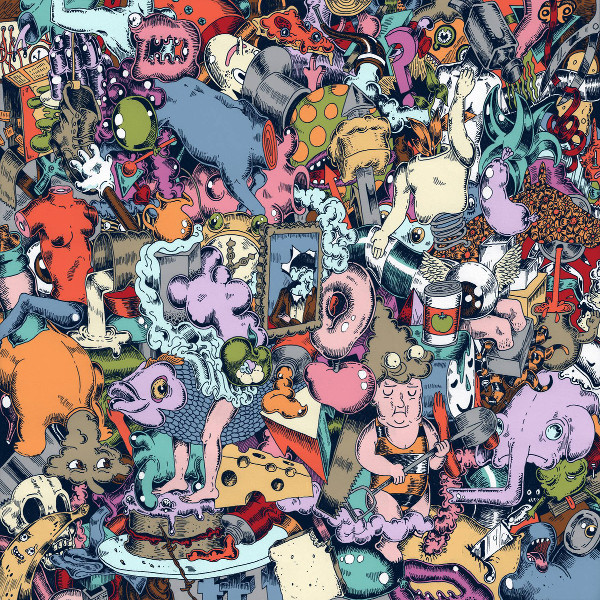 Goblinsz, KaTaTaK, Künstler Scheiße: Primarily Künstler Scheiße was written in Seattle before we left the country. And at that point Ben Reece joined us on guitar. We really enjoyed our band chemistry and finally had found a likeminded person to share compositional duties with so we wrote like crazy in both Seattle, and once we set up in Berlin. This resulted in writing about four albums worth of material (one of which is released, KaTaTaK to be released this September, Moldy Pony and Zombie TBA). With this band Max Steiner came from Seattle and Rieko Okuda (from Berlin) joined as our live members. We mainly toured as a four-five piece during this time period.
Goblinsz, KaTaTaK, Künstler Scheiße: Primarily Künstler Scheiße was written in Seattle before we left the country. And at that point Ben Reece joined us on guitar. We really enjoyed our band chemistry and finally had found a likeminded person to share compositional duties with so we wrote like crazy in both Seattle, and once we set up in Berlin. This resulted in writing about four albums worth of material (one of which is released, KaTaTaK to be released this September, Moldy Pony and Zombie TBA). With this band Max Steiner came from Seattle and Rieko Okuda (from Berlin) joined as our live members. We mainly toured as a four-five piece during this time period.
2017-Present The medieval scientist era
Hungarian Spa, Ballard, Infinite Jim (many others): After the dissolution of our past lineup we focused mainly on writing new fully orchestrated material. We met Kenny Stanger (guitar), Matt Kennon (tenor and alto Sax) , Roberto Vicchio (trumpet) , Matt Paull (keys), Davide Piersanti (trombone) here in Berlin. At this point we created a horn section with fabulous Berlin jazz players, a keys guy from New Zealand, and two americans (hah). Our current lineup is focused on recording our new pieces at the moment and we shall see what the future holds with them.
What is life like for American musicians living in Berlin on both practical and artistic levels?
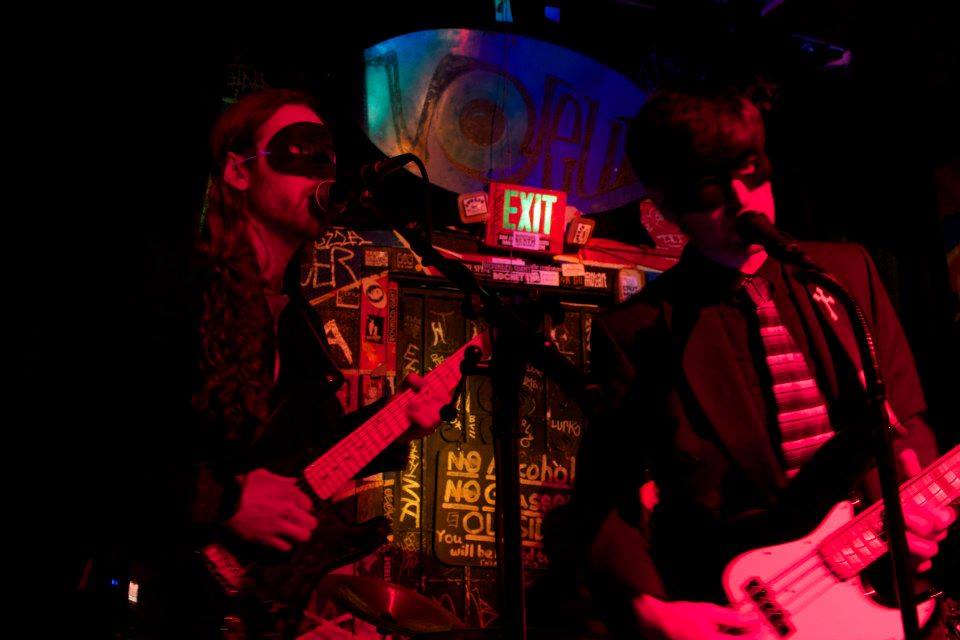 N: Living as an American expat in Berlin is a bit complicated at first, but once you figure out the bureaucracy, it’s actually very simple. The hard part is making money. There is a surprising amount of work, but getting legally hired might take a while. They have a lot of programs to support artists, but unfortunately most of them do not apply to non-EU citizens. The English language is huge here, which makes it a bit difficult to learn German but easy to communicate with most people. Other than that, it is fairly cheap to live so it is conceivably possible to carve out a nice life comprised of touring, playing music, and working part time. In the States I had to work three jobs just to keep afloat and make music. On an artistic level Berlin is very centrally located so you have easy access to both Eastern and Western Europe, which makes touring amazing if you have the time to spend booking and making contacts. The city itself has been a hotbed for music and art for over 100 years. This gives it a very solid infrastructure for artists. Berlin just exists as some chaotic force, like a pirate ship with a drunken captain. It never has to prove itself or try to convince people that it’s cool. Things just happen, people come and leave and it’s always in a state of flux. I like to compare this climate with that of Seattle. Sorry to talk shit, but I feel like the scene in Seattle is always trying to prove that it exists and that what’s happening is really groovy. The 90s was great and it produced some amazing artists, but it was a bit of a fluke. Nothing as genuine, creative, or rebellious came before or after in my opinion. Berlin is just this slowly morphing giant. It was the centre of 50+ years of political and social transition and chaos, and you can really tell that that atmosphere shaped the attitude of the city and the people that live here. Of course, that chaos does not always produce quality art. There are a lot of people living here to take advantage of the relaxed lifestyle but if you have the drive, the possibilities are endless. The ceiling is still there but it’s a lot higher than in the States. You seem to have more control over where you go and what you do, both artistically and just in general. However, I’m making it out to be some kind of paradise, which it definitely isn’t. Berlin is totally nuts and it makes you and everyone else who lives here insane.
N: Living as an American expat in Berlin is a bit complicated at first, but once you figure out the bureaucracy, it’s actually very simple. The hard part is making money. There is a surprising amount of work, but getting legally hired might take a while. They have a lot of programs to support artists, but unfortunately most of them do not apply to non-EU citizens. The English language is huge here, which makes it a bit difficult to learn German but easy to communicate with most people. Other than that, it is fairly cheap to live so it is conceivably possible to carve out a nice life comprised of touring, playing music, and working part time. In the States I had to work three jobs just to keep afloat and make music. On an artistic level Berlin is very centrally located so you have easy access to both Eastern and Western Europe, which makes touring amazing if you have the time to spend booking and making contacts. The city itself has been a hotbed for music and art for over 100 years. This gives it a very solid infrastructure for artists. Berlin just exists as some chaotic force, like a pirate ship with a drunken captain. It never has to prove itself or try to convince people that it’s cool. Things just happen, people come and leave and it’s always in a state of flux. I like to compare this climate with that of Seattle. Sorry to talk shit, but I feel like the scene in Seattle is always trying to prove that it exists and that what’s happening is really groovy. The 90s was great and it produced some amazing artists, but it was a bit of a fluke. Nothing as genuine, creative, or rebellious came before or after in my opinion. Berlin is just this slowly morphing giant. It was the centre of 50+ years of political and social transition and chaos, and you can really tell that that atmosphere shaped the attitude of the city and the people that live here. Of course, that chaos does not always produce quality art. There are a lot of people living here to take advantage of the relaxed lifestyle but if you have the drive, the possibilities are endless. The ceiling is still there but it’s a lot higher than in the States. You seem to have more control over where you go and what you do, both artistically and just in general. However, I’m making it out to be some kind of paradise, which it definitely isn’t. Berlin is totally nuts and it makes you and everyone else who lives here insane.
Since relocating to Europe, you’ve connected with a number of other bands and musicians, both playing shows together and recording. Tell me about some of these.
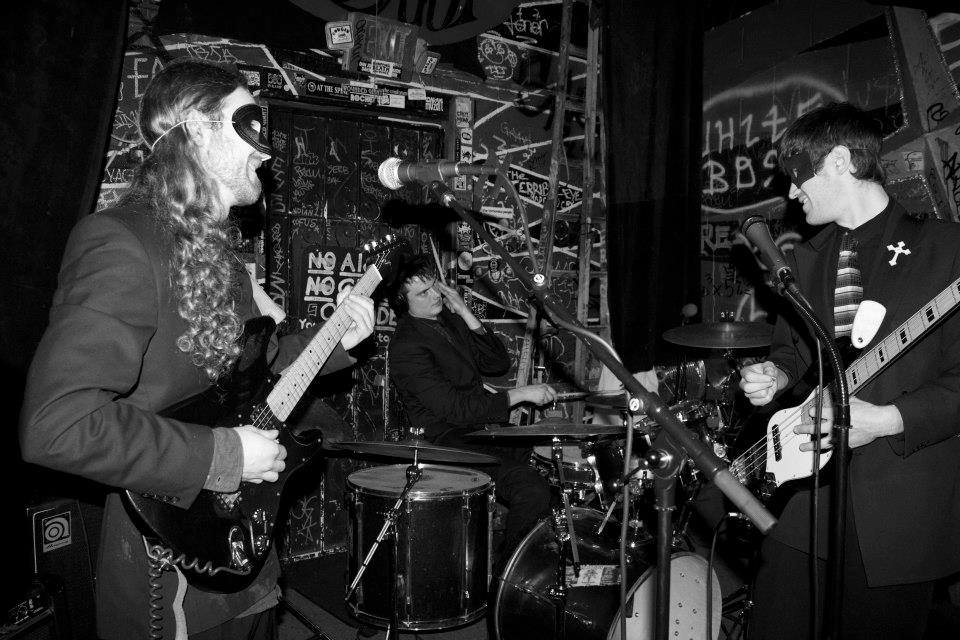 N: After Costa Rica, our plan was to live in the UK so we started building a massive database of music venues and musicians a lot of which we were introduced to by Dann Chinn of Misfit City. Through him we found promoters like Chaos Theory in London and Buttonpusher in Nottingham and countless bands scattered throughout the UK. There’s a pretty big math rock and post rock scene there with bands like Alright the Captain, whom we set up a show for in Berlin, Knifeworld with Kavus from Cardiacs, Ham Legion, Trojan Horse, Sanguine Hum, and the Fierce and the Dead whom we played with in London. Of course there is Hot Head Show from London who are one of our favourite bands and are still trying to set up a gig with them. Once we got to Berlin we basically immediately started booking a French tour and found a great scene there. Bands like Ca, Sans Plumb, Poil, Ni, Sec, Chromb, Alfie Ryner, We Insist!. There’s a lot more but those are some off the top of my head The French scene is pretty weird. Like complicated cartoon soundtracks.
N: After Costa Rica, our plan was to live in the UK so we started building a massive database of music venues and musicians a lot of which we were introduced to by Dann Chinn of Misfit City. Through him we found promoters like Chaos Theory in London and Buttonpusher in Nottingham and countless bands scattered throughout the UK. There’s a pretty big math rock and post rock scene there with bands like Alright the Captain, whom we set up a show for in Berlin, Knifeworld with Kavus from Cardiacs, Ham Legion, Trojan Horse, Sanguine Hum, and the Fierce and the Dead whom we played with in London. Of course there is Hot Head Show from London who are one of our favourite bands and are still trying to set up a gig with them. Once we got to Berlin we basically immediately started booking a French tour and found a great scene there. Bands like Ca, Sans Plumb, Poil, Ni, Sec, Chromb, Alfie Ryner, We Insist!. There’s a lot more but those are some off the top of my head The French scene is pretty weird. Like complicated cartoon soundtracks.
Germany has a different kind of scene but still amazing. Some great musicians have come our way as well. I’ve lost track of how many we’ve worked with but on our last two tours we were able to manage a seven-piece band with Matt Kennon on saxophone, Roberto Viccio on trumpet, Kenny Stranger on guitar, and Matt Paul on keys, all amazing musicians. Of course our first keyboardist in Berlin was the incredible Rieko Okuda, who we still work with on occasion. She was a huge component to the KaTaTaK album, so she’s all over that one. And yeah, it was fun working with Adam on the Goblinsz..? album.
How would you describe the music scenes in some of the places you’ve toured to in the last few years?
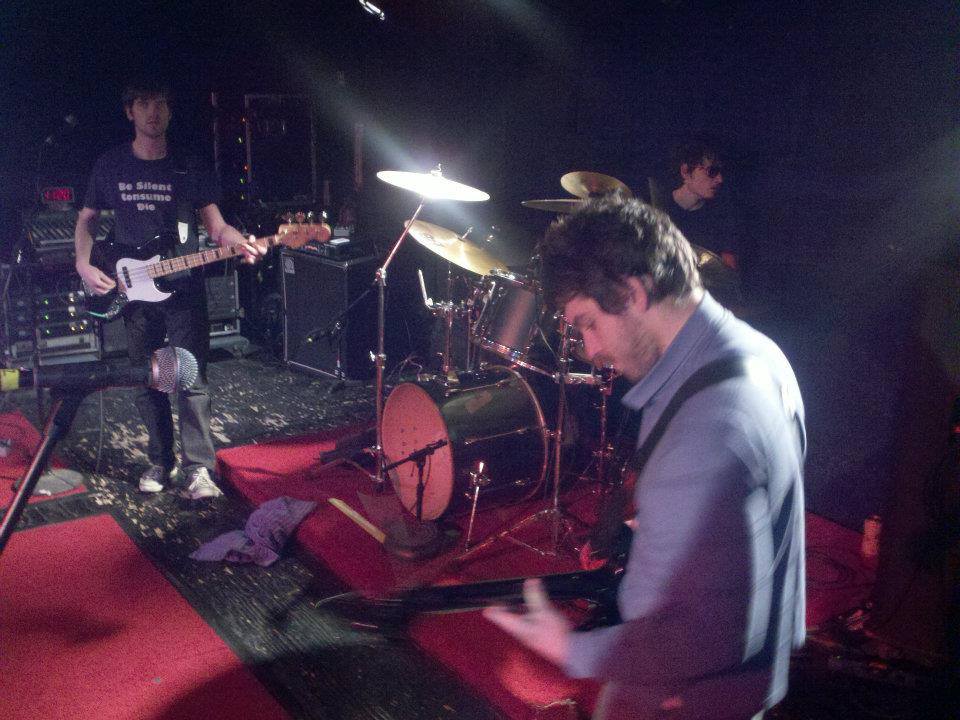 K: Hard to say. There’s an independent scene throughout Europe. I’ve noticed that France has more of an avant-garde approach. Experimental rock in Germany has either jazz or metal-like vibes. But that all sounds asinine. All I can really definitely say is that brewing under the surface of all this techno and pop crap, there’s a fun and interesting group of people (audience and bands) who are dedicated to pursuing something more.
K: Hard to say. There’s an independent scene throughout Europe. I’ve noticed that France has more of an avant-garde approach. Experimental rock in Germany has either jazz or metal-like vibes. But that all sounds asinine. All I can really definitely say is that brewing under the surface of all this techno and pop crap, there’s a fun and interesting group of people (audience and bands) who are dedicated to pursuing something more.
N: Our first European tour was in France in 2015 and we discovered a pretty huge circuit of experimental and RIO music. The French take on it is a bit more goofy and silly, but also heavily composed and complicated. We met a lot of people who were very committed and enthusiastic about booking and supporting bizarre bands. It’s a nice community of organizers, musicians, promoters, and venues who all know each other and work together to support bands and help them get shows, etc. This seems to be a consistent element to the European music scene in general. The underground network of experimental music is very strong and community-oriented, and the audience you attract is almost built into the scene at each venue. The UK is a bit like France in that in each city there are a few venues and promoters who are the go-to guys to contact (if you can get ahold of them) for booking our type of music. In Germany, it is a bit different. I think the audience is different and people seem less connected in some way, but there still exists these champions of good music who are setting up great shows. A lot of free jazz tours and very avant garde stuff. We toured Eastern Europe in 2016 and found thriving and interesting community there as well. A lot of engaging people who have different standards for what they think music is and just want to hear people go crazy on stage. I think the world is so connected at this point that in any country you can find whatever you're looking for. Most bands playing around do it a lot in many different countries and have band members from all around the world.
Much of your music is presented in lengthy tracks that have many different sections. How do these come together? Are they conceived that way from the beginning, or assembled from smaller bits?
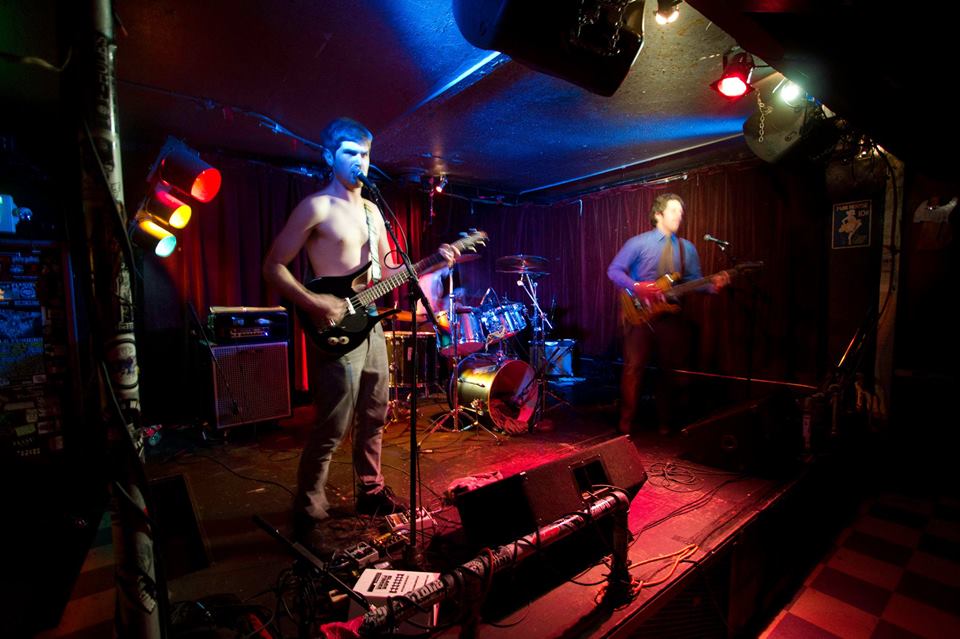 K: In the past I would bring in a framework or skeleton to the group. But these weren’t concrete by any means. Nic would often have other ideas or we would just naturally arrive in some other place as we jammed the music. Generally our music has some sort of head or the meat of the idea, distorted or perverted versions of the riff, and jam-like sections inserted that are based around the general idea or “tone” of the piece. It fluctuates like classical movements more than straightforward rock sections. Although none of these are rules, and we constantly alter our musical output based on the general concept of the piece. Some of our music is silly though, and not taken with the same amount of consideration. I’d say we never have an overarching approach to how we write, and it just depends on what we’re interested in. Many times we’ve done live jams that eventually turned into pieces or parts of other songs. Or we cut from one song and insert it somewhere else. Currently however we’re more focused on composing everything initially (writing it all out) then bringing those ideas in and as we play them we change the music in that way.
K: In the past I would bring in a framework or skeleton to the group. But these weren’t concrete by any means. Nic would often have other ideas or we would just naturally arrive in some other place as we jammed the music. Generally our music has some sort of head or the meat of the idea, distorted or perverted versions of the riff, and jam-like sections inserted that are based around the general idea or “tone” of the piece. It fluctuates like classical movements more than straightforward rock sections. Although none of these are rules, and we constantly alter our musical output based on the general concept of the piece. Some of our music is silly though, and not taken with the same amount of consideration. I’d say we never have an overarching approach to how we write, and it just depends on what we’re interested in. Many times we’ve done live jams that eventually turned into pieces or parts of other songs. Or we cut from one song and insert it somewhere else. Currently however we’re more focused on composing everything initially (writing it all out) then bringing those ideas in and as we play them we change the music in that way.
What is the composition process? How much is planned in detail (or even scored) versus improvised or even edited together?
K: Depending on the albums as they’re all sort of different. But currently we score all of our music out and have certain sections open to interpretation. In the past we were actually far less improvisational and had set lengths and cues for most “improvised” parts. Our process is consistently evolving and changing depending on our interests, but currently Nic and I have been just writing everything out on staff fully orchestrated and presenting it to our live group. Usually I’ll have a general idea which I have been writing out in Sibelius and we then trade the ideas back and forth until it becomes what we want it to be. We’ve changed quite a bit from the normal rock band jamming to what we do today. Which I’d say is rooted more in composition and interpretation than how we did it in the past. As originally we’d expect members to come up with concepts on the spot. For instance a piece we’re currently performing live, “Hungarian Spa,” was written over the course of a year. From the initial riffs that came from me sitting in a room, to bringing them to Nic and then for us taking those ideas and then scoring the music to writing horns, guitar, additional sections etc. The improvisational aspects arrived on their own, whenever we felt that it made sense to jam or solo over a section. Many times we’ve had a rotating lineup so we just leave sections open to interpretation depending on who wanted to take a solo or if we wanted to “rock it.”
Tell me about the recording of Künstler Scheiße.
K: Künstler was recorded live at Mike Sopko’s (Glimpse Trio) studio in Oakland. We had just been on a long tour and were in perfect shape to do the recording, so all the rhythm and solos and everything were just performed live together in room. I got the multi-tracks from Sopko when we moved to Berlin and had my recording gear sent here. I edited as much as I could get away with and then we had a ton of Berlin musicians come in and overdub onto the live tracks. Rieko played keys and synth, Max did additional guitar, Johannes on sax, Peter Kuhnsch on hand percussion, Carl O’Sullivan on vocals, Otto Horvath trombone, Charlotte Birkenhauer vibes, Rob Mattesi on trumpet. It was quite a project — especially since originally it was just planned for a trio (Nic, Ben, and I). Once everyone had overdubbed I had the fun task of editing everything down (almost had a nervous breakdown) and mixing. Which was quite difficult, considering making the live material gel with overdubbed sections.
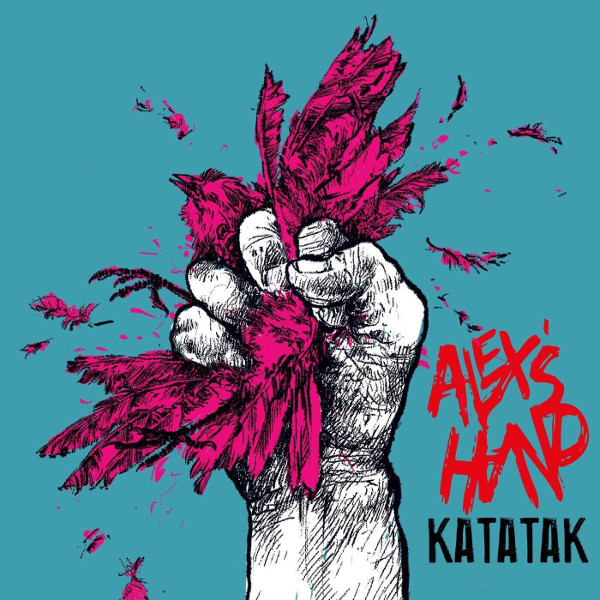 What was different for KaTaTaK?
What was different for KaTaTaK?
K: The writing process for KaTaTaK started very differently than Künstler. On Künstler, “Mars Travolta,” “Oh Bill,” and “Habib’s” came initially from lengthy live jam recordings that we culled and reworked. “Samba,” “Slave,” and “Evan’s Lips” were mainly songs that Nic and I had worked out more or less before Ben’s involvement. Although once he joined we changed the songs in one way or another. After touring and playing these songs for a couple years we had learned a lot about each other and our stylistic approaches, and I feel KaTaTaK is the result of that. Ben sort of walked into an initial approach that was just mainly Nic and I writing everything, but once he became a major creative contributor in his own right, we started collaborating together more seamlessly. In 2014, we began the lengthy process of writing the new album: the music changed from a live jam attitude to something more concentrated and intentional. Improvisation seemed more pointed in this case, solos refined and sectional ideas more concrete. Max Steiner (electric guitar) and Rieko Okuda (piano, keys, synth) joined us as well, which allowed for larger and more grandiose possibilities. We were intent also on making more of a “live record.” Meaning exactly as we performed it live, with a raw intention very limited overdubs and little to no additional arrangement. Which is quite different from how we approached most of our other records. The bass and drums were recorded live together, both guitars and keys were recorded in very quick succession without time to do “perfect takes.” The mixing phase was very minimal as well by comparison to past albums as we spent time focused on a jazz style approach. Meaning light compression, effects were from the pedals and amps, and EQ’ing was kept quite minimal. It’s a minimal, spastic, refined, more straight rock-oriented affair in our minds. But everyone else will just call it avant-garde math pseudo-jazz psycho-cat meowsic.
What are some of your activities outside of AH?
 K: Non musical activities? I don’t really have many. I write music constantly.The Hand is pretty much constantly requiring most of if not all of our creative output and it is mainly our release for any/all ideas. I do have some solo work I hope to release at some point but no current set release date. Just a collection of composed material that doesn't fit with the Hand. I do occasionally play and jam with musicians outside of the Hand but nothing seriously pursued at this time.
K: Non musical activities? I don’t really have many. I write music constantly.The Hand is pretty much constantly requiring most of if not all of our creative output and it is mainly our release for any/all ideas. I do have some solo work I hope to release at some point but no current set release date. Just a collection of composed material that doesn't fit with the Hand. I do occasionally play and jam with musicians outside of the Hand but nothing seriously pursued at this time.
N: Trying to stay sane in Berlin is like a whole life in itself. Playing music constantly really helps with that. I’ve played around a bit with other projects and was doing a lot of jam sessions when we first got here. I played a couple gigs with a harsh noise group called Gift! that was heavily influenced by Glenn Branca. I recently did a few gigs around Europe with a band from L.A. called the Rezurex, which is kind of like this horror punk psychobilly type thing. But as Kellen said, my artistic ambitions are pretty much all consumed by AH, although it's good to exercise my drumming chops with other projects on occasion. So basically my life is generally consumed by practice, recording, composing, going to the gym, and making sandwiches.
What are the near-term plans for the band? How about longer term?
K: We’re going to be releasing a new album September 1st 2017 called KaTaTaK that Nic, Ben Reece, and I wrote when we first arrived in Berlin. The material is about three years old, however, and we have a ton of new music we’ve been writing in that time period. (We just have an incredibly long turnaround time. As we sit with our music and make sure it’s exactly the correct pieces, edits and arrangement that we prefer. Everything intentional.) In the long term we have a large orchestrated piece that we spent a year writing (with Kenny Stanger) called “Hungarian Spa” which we’ve begun recording with our current live ensemble and have plans to release and tour with it, although no date has been set. We have an orchestral piece entitled “Zombie” that we wrote with Ben Reece that’s going to take a long time to record. It’s written for a 21-piece orchestra so it’s quite an endeavor to see it through. We also plan on releasing it as a theatrical event in Berlin to be performed live sometime in 2018. But no specifics yet. We have a ton of various musical pieces waiting around to be recorded but as our aspirations and writing have changed the requirements in the recording process become harder and harder.
How does a band like AH survive in today’s world? How do you balance business with creativity?
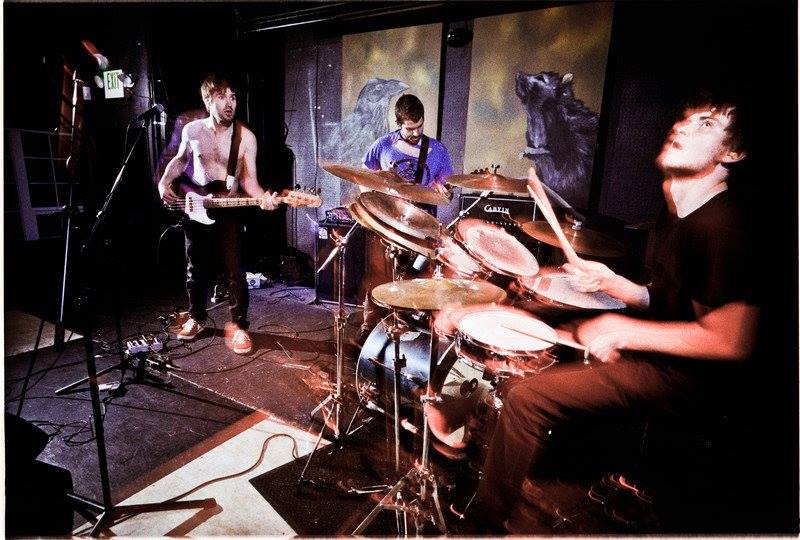 K : Music and creation is an important aspect of why we’re alive. To me it's not so much being a thing that I could ever do without. It’s something that I’m required to do by the little demon inside me yelling to get out. We survived so far by not letting anything get in our way. Even if we’ve been broke starving artists in Berlin, Seattle, Costa Rica, England, Ireland, etc. We never let the “real world” get in the way of our aspirations. If we want to tour France, we find a way. Even without money or proper living situations. And that main aspect of our worldview has forced us to persevere despite the setbacks. Oftentimes the money issue has made trouble for us with our intended creative output (orchestral works, large scale band tours, quality recordings) but we still slowly lumber along, finding ways to accomplish what we want anyway. We’re not marketable. Too insane, interested in all sorts of music and musical interpretations and directions, which works against the factory grade image that bands are apparently forced to have in today’s marketplace. We don’t understand social networking, we’re not marketing people, we don't have a glossy finish and most labels, bookers, and venues are not our friends. (Excluding RAIG and like-minded people of course). The business aspect never makes sense, as we should be making pop music if money was the be-all, end-all goal. Of course, we’re dedicated and do what we do continuously because we hope someday that both our love and care for the art coupled with the spectacular growing audience and luck we’ve had will meet in the middle with making enough money to both make art and survive (Imagine that!). This would probably mean that the entire music industry has changed, pop music stopped being boring, and suddenly the audience went from valuing nostalgia and those damn normie chord progressions to looking for and pursuing music with risk.
K : Music and creation is an important aspect of why we’re alive. To me it's not so much being a thing that I could ever do without. It’s something that I’m required to do by the little demon inside me yelling to get out. We survived so far by not letting anything get in our way. Even if we’ve been broke starving artists in Berlin, Seattle, Costa Rica, England, Ireland, etc. We never let the “real world” get in the way of our aspirations. If we want to tour France, we find a way. Even without money or proper living situations. And that main aspect of our worldview has forced us to persevere despite the setbacks. Oftentimes the money issue has made trouble for us with our intended creative output (orchestral works, large scale band tours, quality recordings) but we still slowly lumber along, finding ways to accomplish what we want anyway. We’re not marketable. Too insane, interested in all sorts of music and musical interpretations and directions, which works against the factory grade image that bands are apparently forced to have in today’s marketplace. We don’t understand social networking, we’re not marketing people, we don't have a glossy finish and most labels, bookers, and venues are not our friends. (Excluding RAIG and like-minded people of course). The business aspect never makes sense, as we should be making pop music if money was the be-all, end-all goal. Of course, we’re dedicated and do what we do continuously because we hope someday that both our love and care for the art coupled with the spectacular growing audience and luck we’ve had will meet in the middle with making enough money to both make art and survive (Imagine that!). This would probably mean that the entire music industry has changed, pop music stopped being boring, and suddenly the audience went from valuing nostalgia and those damn normie chord progressions to looking for and pursuing music with risk.
Band photos courtesy of Alex's Hand.
Filed under: Interviews
Related artist(s): James DeJoie, Dennis Rea, Alex's Hand
What's new
These are the most recent changes made to artists, releases, and articles.
- Review: The Adelaidean - Nine Breaths
Published 2026-02-15 - Release: Maledictis - Echoes of Consciousness
Updated 2026-02-14 23:32:42 - Artist: Maledictis
Updated 2026-02-14 23:26:54 - Release: Falter Bramnk - Vinyland Odyssee
Updated 2026-02-14 00:25:55 - Review: Pier Niccolò "Bambi" Fossati - ...Il Castello Tira Sassi...
Published 2026-02-14 - Review: Balloons for the Dog - Wicked Forms of Old Snow
Published 2026-02-13 - Release: Evergrey - Architects of a New Weave
Updated 2026-02-12 19:15:23 - Release: Richard Barbieri - Hauntings
Updated 2026-02-12 19:13:57 - Release: Major Parkinson - Valesa II: Viva the Apocalypse!
Updated 2026-02-12 19:11:44 - Review: Michael Brückner - A Sequence of Colours
Published 2026-02-12 - Release: Tenk Van Dool / Paul Sears - Basal Ardor
Updated 2026-02-11 23:59:30 - Release: Craig Padilla & Marvin Allen - Unfolding Skies
Updated 2026-02-11 23:53:32 - Review: Michael Moorcock & the Deep Fix - The New Worlds Fair (50th Anniversary Edition)
Published 2026-02-11 - Listen and discover: Take flight with Steve Roach
Published 2026-02-10 - Review: Denman Maroney Quintet - Umwelt
Published 2026-02-10 - Review: Ubiks - Ciudad Sumergida
Published 2026-02-09 - Release: Fabio Anile - Minutiae
Updated 2026-02-08 00:46:44 - Artist: Fabio Anile
Updated 2026-02-08 00:42:58 - Review: Schizo Fun Addict - Pasteline Dream
Published 2026-02-08 - Release: Tom Salvatori - Lullaby for Jude
Updated 2026-02-07 19:52:27
